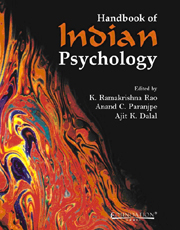Book contents
- Frontmatter
- Contents
- Contributing Authors
- Preface
- 01 Prologue: Introducing Indian Psychology
- 02 Indian Thought and Tradition: A Psychohistorical Perspective
- PART I SYSTEMS AND SCHOOLS
- 03 Jaina Psychology
- 04 The Foundations of Early Buddhist Psychology
- 05 Varieties of Cognition in Early Buddhism
- 06 A Buddhist Theory of Unconscious Mind (Ālaya-Vijñāna)
- 07 Indian Buddhist Theories of Persons
- 08 Buddhist Psychology: A Western Interpretation
- 09 Transpersonal Psychology in the Bhagavad-Gītā: Reflections on Consciousness, Meditation, Work and Love
- 10 Yoga Psychology: Theory and Application
- 11 Patañjali Yoga and Siddhis: Their Relevance to Parapsychological Theory and Research
- 12 Yoga Psychology and the, Sāṃkhyā Metaphysic
- 13 Psychology in the Advaita Vedānta
- 14 The Nyāya-Vaiśeṣika Theory of Perceiving the World of our Experience
- 15 Psychological Theories and Practices in Āyurveda
- PART II TOPICS AND THEMES
- PART III APPLICATIONS AND IMPLICATIONS
- Pronunciation and Transliteration of Sanskrit Alphabet
- Glossary
- Index
05 - Varieties of Cognition in Early Buddhism
from PART I - SYSTEMS AND SCHOOLS
Published online by Cambridge University Press: 26 October 2011
- Frontmatter
- Contents
- Contributing Authors
- Preface
- 01 Prologue: Introducing Indian Psychology
- 02 Indian Thought and Tradition: A Psychohistorical Perspective
- PART I SYSTEMS AND SCHOOLS
- 03 Jaina Psychology
- 04 The Foundations of Early Buddhist Psychology
- 05 Varieties of Cognition in Early Buddhism
- 06 A Buddhist Theory of Unconscious Mind (Ālaya-Vijñāna)
- 07 Indian Buddhist Theories of Persons
- 08 Buddhist Psychology: A Western Interpretation
- 09 Transpersonal Psychology in the Bhagavad-Gītā: Reflections on Consciousness, Meditation, Work and Love
- 10 Yoga Psychology: Theory and Application
- 11 Patañjali Yoga and Siddhis: Their Relevance to Parapsychological Theory and Research
- 12 Yoga Psychology and the, Sāṃkhyā Metaphysic
- 13 Psychology in the Advaita Vedānta
- 14 The Nyāya-Vaiśeṣika Theory of Perceiving the World of our Experience
- 15 Psychological Theories and Practices in Āyurveda
- PART II TOPICS AND THEMES
- PART III APPLICATIONS AND IMPLICATIONS
- Pronunciation and Transliteration of Sanskrit Alphabet
- Glossary
- Index
Summary
Buddhism is classed among the world's major religions. The teachings of Buddhism can be traced back to its founder, Gotama Buddha, who proclaimed after a laborious search for the nature of good life that he became enlightened regarding a certain reality that was not known to the existing authoritative traditions of his time. The essence of the Buddha's enlightenment experience was formulated in the first sermon of the Buddha in the form of Four Noble Truths. In presenting the Four Noble Truths the Buddha insisted that these truths were not among the holy teachings handed down in previous authoritative traditions and claimed that vision, knowledge, insight and illumination regarding them dawned on him (Saṃyutta Nikāya, vol. V, p. 425). What the Buddha realized was described by him as profound, difficult to see, difficult to understand, but yet appeasing, pleasant, not obtainable by speculation, subtle and knowable by the wise (Vinaya Piṭaka, vol. I, p. 4). His insight into reality was also presented as a penetration into the “dependent arising” nature of things (idappaccayatā paṭ iccasamuppādo). It was around this core of the Buddha's articulation of his enlightenment experience that Buddhism has evolved over the last two thousand five hundred and fifty years of its history, developing sometimes in widely divergent directions and taking multifarious religious and philosophical forms. The attempt in this enquiry is not to focus attention on all the numerous subsequent developments of the tradition based on how imaginative teachers of the tradition under different historical and cultural contexts understood the original message and interpreted it, but to focus attention on the significance of the Buddhist claim to a specific kind of knowledge.
- Type
- Chapter
- Information
- Handbook of Indian Psychology , pp. 85 - 104Publisher: Foundation BooksPrint publication year: 2008
- 3
- Cited by

